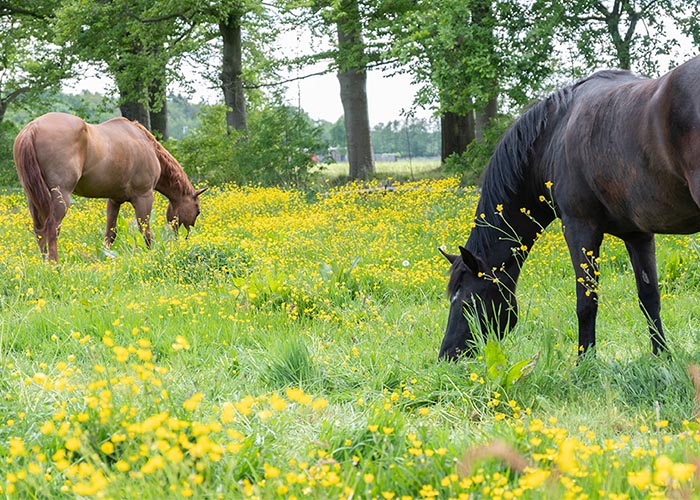Horses should not eat buttercups due to their toxic nature. Buttercups can be harmful to horses.
Horses are majestic creatures known for their strength and beauty. As responsible caretakers, it is crucial to have a comprehensive understanding of what horses can and cannot eat. One common question that arises is whether horses can consume buttercups. While the vibrant yellow flowers may add a pop of color to fields and gardens, it is important to note that buttercups are toxic to horses.
We will delve deeper into the potential dangers posed by buttercups and why they should be avoided as a part of a horse’s diet. By being aware of these risks, horse owners and enthusiasts can ensure the well-being and health of their beloved animals. So, read on to learn more about buttercups and their potential impact on horses.
Understanding The Risks
Buttercups may seem harmless, but horses should not eat them due to potential risks. Ingesting these flowers can have detrimental effects on a horse’s health and overall well-being. Symptoms of buttercup poisoning can include gastrointestinal distress, such as colic and diarrhea, as well as skin irritations and blistering.
This plant contains toxins that can cause a range of issues for horses, including excessive salivation and difficulty eating. It’s important for horse owners to be aware of the dangers that buttercup ingestion can pose and take necessary precautions to keep their animals safe.
Regular inspections of grazing areas for this yellow plant can help reduce the risk of exposure.
Identifying And Managing Buttercup Growth
Buttercups are common plants that can be found in horse pastures. It’s important to recognize the various types of buttercup plants in order to effectively manage their growth. Strategies for controlling buttercup growth include implementing safe grazing practices. By implementing proper pasture management techniques, such as mowing and rotational grazing, horse owners can minimize the presence of buttercup plants.
Regular inspection of pastures and removing buttercups by hand can also be an effective way to control their growth. Ensuring that horses have access to a well-balanced diet and a variety of forage can also help to deter them from consuming buttercups.
Overall, it is crucial for horse owners to be aware of the potential hazards of buttercups and take the necessary steps to minimize their presence in horse pastures.
Ensuring A Healthy Diet For Horses
Buttercups are not recommended as a part of a horse’s diet due to their toxic properties. When planning a healthy feeding regimen for horses, it is crucial to evaluate their nutritional needs. Opting for safer alternatives and avoiding buttercups can prevent any potential harm to horses.
A balanced and varied feeding plan is essential, incorporating a mix of hay, grains, and fresh pasture to ensure they receive all necessary nutrients. High-quality hay can provide vital fiber, while grains like oats or barley can offer additional energy.
Fresh pasture allows horses to graze and consume natural forage. By carefully assessing the nutritional requirements and avoiding harmful plants like buttercups, horse owners can maintain their equine companions’ wellbeing.

Credit: blog.cheshirehorse.com
Preventative Measures For Protecting Horses
Buttercups can be harmful to horses if ingested, so it’s important to take preventative measures. Establishing a regular pasture maintenance routine is crucial in keeping buttercup growth under control. By regularly mowing the pasture and removing any plants, you can minimize the risk of horses coming into contact with buttercups.
Monitoring and maintaining horse health regularly is also essential. Regular veterinary check-ups and keeping an eye out for any signs of poisoning or health issues will help ensure the overall well-being of the horses. It’s important to be proactive in preventing buttercup ingestion and safeguarding your horses’ health.
Conclusion
It is crucial to be aware of the potential dangers that buttercups pose to horses. While horses may be inclined to eat them due to their attractive appearance, these flowers contain toxins that can harm their health. Buttercups contain a substance called ranunculin, which, when ingested, can cause digestive issues, mouth ulcers, and even lameness in horses.
Therefore, it is best to prevent horses from grazing in areas where buttercups are abundant and to regularly inspect their grazing pastures. By providing horses with a well-balanced and nutritious diet, ensuring they have access to clean water, and maintaining a safe environment, we can help minimize the risks associated with buttercups and promote the overall health and well-being of our equine companions.
Remember, it is always better to be safe than sorry when it comes to our beloved horses’ dietary choices.
